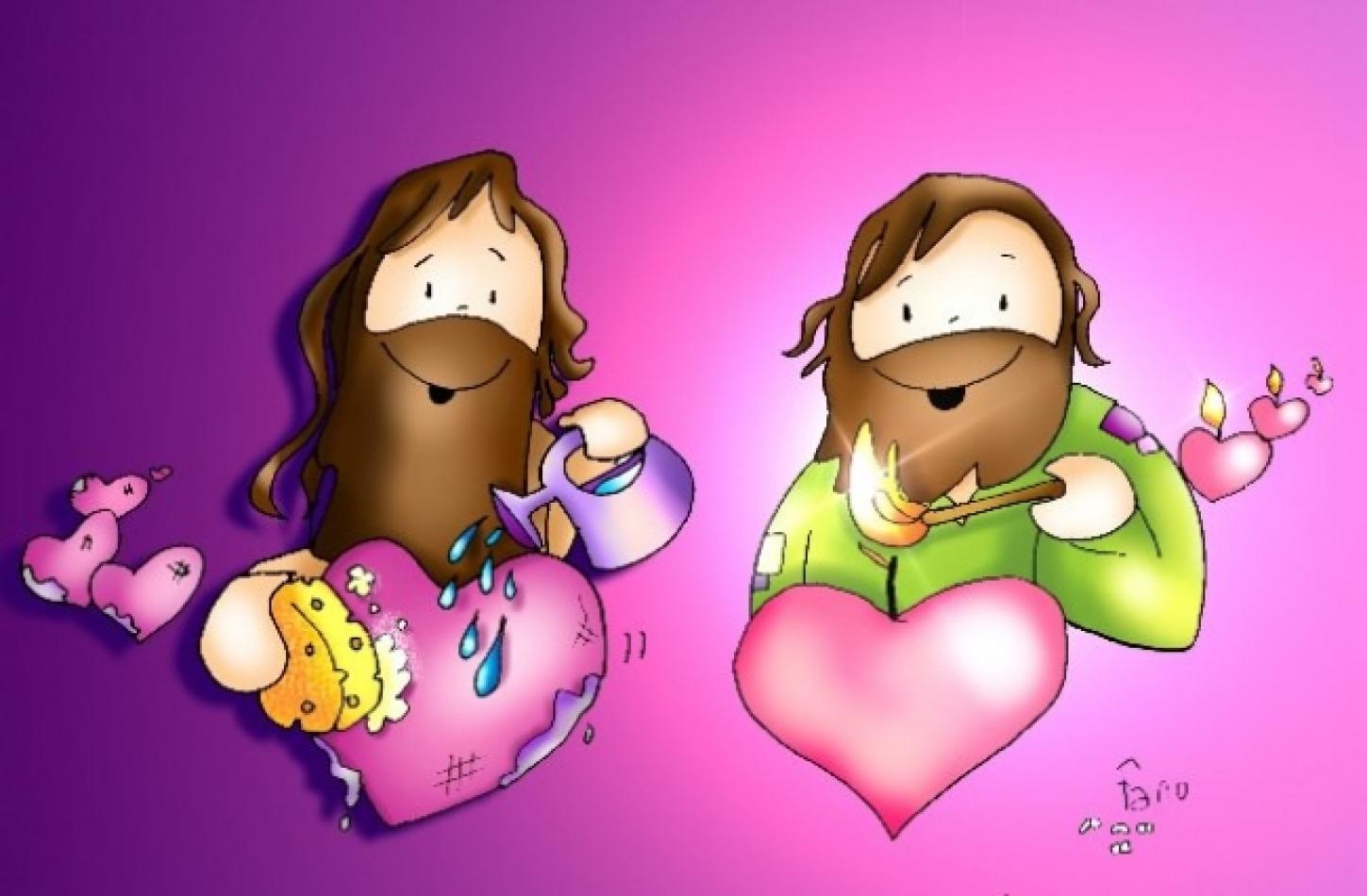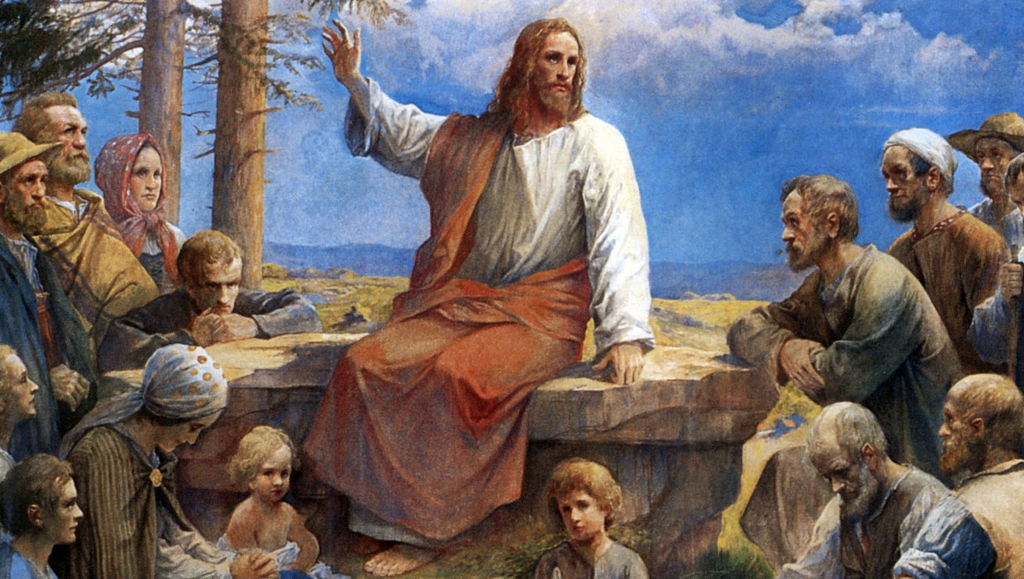Daniel Comboni
Comboni Missionaries
Institutional area
Other links
Newsletter
Jesus says: the time of judgment is coming—the new world is going to rise. The signs of the great fire that will renew the face of the earth are obvious: “the blind see, the deaf hear, the lame walk, the lepers are cured, the dead are raised and the good news is announced to the poor” (Mt 11:5) and yet there are people who do not care in the least. They will be caught unprepared.
Jer 38:4-10, Ps 40, Heb 12:1-4, Lk 12:49-53
‘I have come to set the earth on fire, and how I wish it were already blazing!’ (Lk 12:49)
Encountering God offers peace. It can also be disruptive
Michael Simone
In the Hebrew Scriptures, divine fire represents the presence of God. Sometimes fire composed God’s body, as in Ez 1:27 or 2 Sm 22:9. Sometimes, fire was all that appeared when God appeared, as in Ex 19:18 or Dt 4:11-12. Beings and objects of fire could visit the earth to accomplish the divine will, as in Ex 3:1-5 and 2 Kgs 2:11. Finally, fire was an essential component of worship, serving as a kind of gate that transmitted offerings from the earthly to the heavenly realm (Jgs 13:20; 2 Chr 7:1-3). In all these cases, fire represents divine presence and action.
Divine fire always demanded a transformation and response. In some cases, an encounter with divine fire inspired deeper faith. Moses became a divine messenger after his encounter with the burning bush, and Israel’s encounter with divine fire at Carmel led them back to the faith of their ancestors. Divine fire protects Jerusalem in the prophecy of Zechariah (Zec 2:5), and fire purifies garments affected by leprosy (Lv 13:47-58). Those who approached God’s fiery presence impiously, however, found the experience destructive. Divine fire took the lives of Aaron’s sons (Lv 10:1-3) as well as the arrogant officers sent to arrest Elijah (2 Kgs 1:9-15). In each case, fire represents divine presence and elicits an irrevocable response from those who encounter it.
On his journey to Jerusalem, Jesus takes stock of the transformation and disruption that his ministry has caused, and he recognizes in it the effects of divine fire. The disciples who continue to follow him have grown stronger in faith and understanding. People from the crowds who turn to him for healing have came away whole. But more and more people are finding him a disruptive presence and rejecting him and his message. Like the divine fire of the Hebrew Bible, Jesus’ presence elicits a response from all who encounter him.
Christ continues to challenge, reaching out today through the sacraments, the Scriptures, the church and the poor. In each case, the call requires conversion of heart. Many will find the Gospel’s affirmation that God is present and still at work to be deeply consoling. This consolation can free many from fear and transform them into servants of God’s kingdom.
For others, however, such an encounter will be disruptive. The peace that Christ offers does not affirm or support the status quo. Those of us who benefit from the world as it is may come away from Christ’s presence feeling scorched. If, through good discernment, we can recognize the divine presence even in those challenging encounters, we will find in it a divine fire that purifies and does not destroy.
Every heart turned to Christ brings a little more of the fiery divine presence into the world. In his own day, Jesus found that his words and actions burned some, but cleansed and inspired many others. Likewise, as we continue his mission today, we must remember the power of the message we bear. Bound up in every word is the divine presence that blazed on Sinai and transformed Israel. We are now God’s fire, purifying, healing, protecting and opening a way between heaven and earth.
https://www.americamagazine.org
Gospel reflection – Luke 12:49-53
Fernando Armellini
What is the fire that Jesus came to bring on earth (v. 49)? What is the baptism that he must receive (v. 50)? Why does he say of not coming to bring peace, but rather division (v. 51)? What are the signs of the time that the hypocrites cannot recognize (v. 56)? What does the parable on the necessity of avoiding the judgment before the court have to do in all this discourse (vv. 58-59)? Today’s Gospel combines a series of rather enigmatic sayings of the Lord. Let us grasp the meaning.
Let’s start with the images of fire and baptism (vv. 49-50). After the flood the rainbow appears in the sky, a symbol of peace restored between heaven and earth. God swears: “Never again will all life be cut off by the waters of a flood, and never again will there be a flood to destroy the earth” (Gen 9:11). From this promise, a conviction is born and spreads in Israel that, to cleanse the world of iniquity, God would no longer use water, but fire: “For by fire will the Lord execute judgment … against all mortals” (Is 66:16). The Baptist also announced the coming of the Messiah with threatening words: “He will baptize you in the Holy Spirit and fire … . The chaff he will burn in everlasting fire” (Mt 3:11-12). Jesus also speaks of fire and, after him, almost all the authors of the New Testament.
What is it about? It is natural to think of the final judgment and eternal punishment that awaits the wicked. Not so fast! Maybe the Baptist and the disciple James and John imagined it so. The two brothers wanted to call down fire from heaven against the Samaritans (Lk 9:54), but surely not Jesus.
The fire of God is not intended to destroy or torture those who made mistakes. It is the instrument with which he wants to destroy evil and purify us from sin.
It is better to let the fire punish the fundamentalist and fanatic preachers of the seven apocalyptics! That one announced by the prophets and lit by Jesus saves, cleanses, heals: it is the fire of his Word; it is his message of salvation; it is his Spirit, that Spirit who, on the day of Pentecost, descended like tongues of fire on the disciples (Acts 2:3-11) and has begun to spread around the world like a beneficial and renewing blaze.
Now we can make sense of the exclamation of Jesus: “How I wish it were already kindled!” (v. 49). It is the expression of his burning desire to see the weeds that the world soon destroyed. Malachi announced: “The day already comes, flaming as a furnace. On that day all the proud and evildoers will be burned like straw in the fire” (Mal 3:19). Jesus looks forward to the realization of this prophecy. He already sees the rising of the new world wherein there will be no more space for the wicked. These will disappear, destroyed by the irresistible flame of his love.
The second image, that of baptism, is linked to the previous one. Jesus says that to unleash this fire, he must first be baptized. To baptize means to submerge and Jesus refers to his immersion in the waters of death (cf. Mk 10:38-39). This water has been prepared by his enemies in order to extinguish forever the fire of his word, love, and Spirit. It instead gets the opposite effect: it communicates to this fire an uncontrollable force. Jesus “looks with anguish” at the passion that awaits him. The prospect that he faces is dramatic: he will be overwhelmed by the waves of humiliation, suffering, and death, but he knows that coming out of these dark waters, on Easter Sunday, the new world will begin.
If this is the fate of the Master, which will be that of the disciples, torchbearers of his fire? They too will provoke—ensures Jesus—dissensions, divisions, hostility and will have to reckon with painful lacerations within their own families (vv. 51-53).
“Do you think that I have come to bring peace on earth? No, I tell you, but rather division.” An amazing baffling statement because in the books of the prophets it is written that the Messiah would be “the prince of peace”; during his reign “peace will have no end” (Is 9:5-6); “The wolf will dwell with the lamb, the leopard will rest beside the kid, and the calf and the lion cub will feed together” (Is 11:6-9); “The warrior’s bow shall be broken, when he dictates peace to the nations. He will reign from sea to sea and from the River to the ends of the earth” (Zec 9:10). In Bethlehem, the angels sing: “Peace on earth!” (Lk 2:14), and Paul writes: “He is our peace” (Eph 2:14).
Will the proclamation of the Gospel bring the world, among peoples, in the families harmony or discord?
It’s true, the prophets have promised peace for the messianic times, but also announced conflicts and separations. When Jesus speaks of misunderstandings between generations (young-old people) and among those living in the same house, he does nothing but quotes a passage from the prophet Micah (Mic 7:6). The prophet had understood that the birth of the new world would not have occurred in a peaceful and painless way and that there would be painful lacerations.
Luke verifies that these breaks occurred in his communities. In the light of the Master’s words, he understands that these were inevitable and the context in which these words are placed helps us to understand why.
The message of Jesus is a fire and—logically—who has the goods to be protected, buildings to be preserved is not keen to see the arsonists. The Gospel is a burning torch that wants to reduce to an immense fire all the unjust structures, the inhuman situations, discrimination, greed of money, the frenzy of power.
Who feels threatened by this “fire” does not remain passive. He opposes by all means. He reacts violently because he wants to perpetuate the world of sin. It is at this point that the first misunderstandings burst, then division and conflict, finally persecution and violence.
Union is not always good and should be approved. Union must be sought from the Word of God, from the truth. Peace founded on lies and injustice, cannot be favored. It must at times provoke, with much love and without offending anyone, healthy divisions.
One must not confuse hatred, violence, offensive, and arrogant words—which are incompatible with the Christian choice—with the honest challenge, disagreements that arise from new, evangelical proposals. These are needed, even if painful, especially when involving members of the same family.
We heard so much after the Council of the stupendous image of the “signs of the times.” It appears on the lips of Jesus in the third part of today’s Gospel (vv. 54-57).
For the farmers it is important to recognize the changes in the weather: They must know when the rains are coming to sow at the right time. They scan the sky, study the wind; they know they cannot go wrong as they risk seeing their own seeds burned by the sun. Why—asks Jesus—are people so attentive to the signs of heat and rain, don’t they know how to recognize the signs of the new world that have appeared? Because—he answers—they are hypocrites. They can see, but do not want to open their eyes. They don’t do it for ignorance, but for ill will. The new reality introduced by his word disturbs them, makes them uncomfortable. They want the old world to continue and pretend (as do the actors, the “hypocrites” in fact) not to notice what is happening.
Luke has in mind the situation of his communities in which many are afraid of the consequences of the Gospel and “pretend” not to notice the changes, transformations, and innovations that it is going to introduce.
The Gospel concludes with a parable (vv. 58-59). A man has wronged another and this threatens to take him to court. What to do? The culprit has no time to lose: he must immediately seek an agreement with his opponent, otherwise, he could be sentenced. What is the meaning of this parable?
Jesus says: the time of judgment is coming—the new world is going to rise. The signs of the great fire that will renew the face of the earth are obvious: “the blind see, the deaf hear, the lame walk, the lepers are cured, the dead are raised and the good news is announced to the poor” (Mt 11:5) and yet there are people who do not care in the least. They will be caught unprepared.
Fernando Armellini
Italian missionary and biblical scholar
https://sundaycommentaries.wordpress.com





